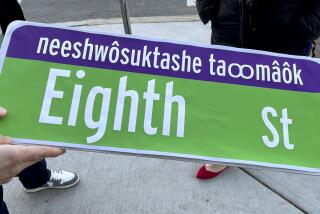French Emerging as Victor in Language War
- Share via
MONTREAL — It once appeared the that French and English languages could live together in Quebec after separatist fervor abated nearly a decade ago, but the struggle resumed in December and French appears to have won.
New issues arise constantly, such as whether the inside of a bus is really outside for sign purposes, and the answer almost every time is that the signs must be only in French. The English-speaking minority, although disgruntled, appears to accept that the fight is lost.
“Resigned is probably the right catchword,” said Donald Taylor, a psychology professor at McGill University.
Language is “a symbol of identity and it also is a resource that has associated power, and status, and success and access,” he said. “So these apparently minor events evoke very primary feelings.”
Cultural Battleground
Quebec was a battleground of culture and language in the 1970s between the 81% with French heritage and a minority with a cultural kinship to Ontario and the other English-speaking provinces.
Power shifted to the French-speaking majority in those years but the separatist tide ebbed after 1980, and with it the dispute over language, when Quebec voters rejected a sovereignty referendum.
Then came a ruling by the Supreme Court of Canada in December that a 1977 Quebec measure requiring all signs to be in French was unconstitutional. The court said French could be required to predominate on all signs but other languages could not be prohibited.
The provincial government, which has broader powers than state governments in the United States, overrode the decision with new legislation for the language on signs.
Compromise Measure?
Bill 178, as it is known, requires that all outdoor signs still be solely in French, but for the first time since 1977 allowed bilingual indoor signs. Provincial Premier Robert Bourassa described it as a compromise.
Rallies by activists of both communities have accompanied the latest round. English signs posted in the street risk being spray-painted, and a fire blamed on arson heavily damaged the offices of Alliance Quebec, the main English-language lobby.
Fewer street protests are held now, but the conflict continues as regulations under Bill 178 are interpreted to restrict indoor bilingual signs more than originally believed.
“It’s taken 21 years, but the Quebec language war is finally over. And the English have lost,” political columnist Don MacPherson wrote in Montreal’s English-language daily Gazette.
Law Called Silly
Jeff Kelly of Alliance Quebec said in an interview: “My concern about Bill 178 is its silliness. You don’t like a law to be silly.”
As an example, he cited the Bourassa government’s determination that the inside of a bus is really an outside location and thus not a proper site for bilingual signs.
“A lot of people in both communities were spoiling for a fight,” Kelly said. “The signs became symbols. Certainly the signs themselves are not what’s at play.”
A prevailing view in Quebec is that the vigorous political fight of the 1970s spawned a new entrepreneurial spirit in the French community, as seen in the province’s support for the new free trade agreement with the United States.
Business administration became the major of choice at French-language universities. Bourassa’s provincial Liberal Party trounced the nationalist Parti Quebecois in 1985 elections.
Bilingualism Becoming Norm
Many English speakers opposed to learning French left the province and, especially among the young, bilingualism is becoming the norm.
Alliance Quebec figures put the rate of bilingualism among the English community, which is centered in Montreal, at 60% in 1986 compared to 37% in 1971.
Until December, the issue of signs was portrayed as being no longer controversial.
Since then, however, English speakers have described the denial of bilingual signs as a major violation of individual rights, and the French say the restriction is necessary to preserve their culture in North America.
“The language is the essence of culture,” said Claude Filion, a Parti Quebecois member of the Quebec legislature. “This compromise (Bill 178) is unacceptable to both the Francophone and the Anglophone.”
Filion said any relaxation of the sign law erodes French as the main language of the province.
“Our position is that Mr. Bourassa should have maintained the status quo,” he said.
More to Read
Sign up for Essential California
The most important California stories and recommendations in your inbox every morning.
You may occasionally receive promotional content from the Los Angeles Times.








